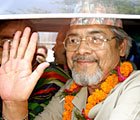 The contortions of Nepalese politics can often be traced to the colorfulness of some of its characters. Take Bamdev Gautam, for instance. A firebrand orator, he has that rare ability to go into vocal hibernation.
The contortions of Nepalese politics can often be traced to the colorfulness of some of its characters. Take Bamdev Gautam, for instance. A firebrand orator, he has that rare ability to go into vocal hibernation.The one-time deputy general secretary of Nepal Communist Party (Unified Marxist-Leninist) is today one of the leading proponents of a closer alliance between the mainstream parties and Maoist rebels. Having evaded the royal government’s last crackdown, Gautam emerged in New Delhi to fine-tune last November’s 12-point pact between the Seven-Party Alliance and Maoists.
After the second memorandum of understanding was made public, Gautam has set for himself a higher goal. He insists that a joint appeal for peaceful protests from the eight parties, perhaps even a fresh rebel ceasefire, could come as early as next month. The final assault on the royal regime is imminent?
What makes Gautam so confident of the triumph of the bipolarization of Nepal’s three-way conflict? His personal contacts with the rebels, perhaps?
Gautam is best remembered for having catapulted Lokendra Bahadur Chand, who had 11 of the 19 MPs of the royalist Rastriya Prajatantra Party, to the premiership in 1997. He inaugurated the process that would fully and formally rehabilitate the ex-panchas.
As Chand’s deputy and home minister, Gautam had struck a tacit understanding with the Maoists, who were in the process of consolidating their hold of the hinterland. The rebels allowed the UML to sweep the local elections.
Gautam’s accomplishment fueled his political ambitions. He broke away from the UML, citing policy and procedural disputes that began with the controversial Mahakali River treaty with India. Gautam took with him a sizeable chunk of comrades to form the Marxist-Leninists and propped up Girija Prasad Koirala’s coalition government. He fell out with the grand old man and focused on rebuilding the party for the next elections. Except that he underestimated the motives and means of his erstwhile UML colleagues, who Koirala had reached out to. Not a single ML member was elected to parliament.
After the blame game subsided, Gautam did the best thing he could. He returned to the UML in the interest of communist unity. All those differences he had cited earlier, well, flowed away in the Mahakali.
After King Gyanendra dismissed the elected government of Prime Minister Sher Bahadur Deuba on October 4, 2002, Gautam appeared ready to give the monarch the benefit of the doubt. As UML leaders stepped up criticism of the palace, Gautam preached moderation. Many saw him as a potential palace-appointed premier.
When UML general secretary Madhav Kumar Nepal ditched the agitating opposition alliance to join Deuba’s government, the top comrade blocked Gautam from leading the party contingent. The UML put up Bharat Mohan Adhikary for deputy premier. When King Gyanendra dismissed Deuba a second time and took over full control on February 1, 2005, appointing himself head of government, Bamdev was infuriated.
Months later, he became the first mainstream commie to travel to the Maoist heartland in western Nepal to strike a deal with the Maoists to inaugurate a democratic republic. The UML hadn’t fully reverted to republicanism yet. So Gautam came in for considerable criticism from his comrades. When the party finally concluded that the palace considered the UML more of a threat than the Maoists, Gautam stood vindicated. Among the most inveterate critics of India, Gautam is now explaining the wisdom of holding talks in New Delhi.
Maila Baje recalls an interview Nepal Television’s Bijay Kumar did with Gautam in 1997 after he cobbled together the Chand-led coalition. The pugnacious Kumar asked the deputy premier whether he had ever expected to reach that post. The question kind of stung Gautam. He told Kumar that he expected to become premier the moment he saw, from the audience gallery in the Rastriya Panchayat, the prime minister answer members’ questions.
The sharp Kumar caught Gautam right there. Entry into the unicameral legislature was restricted to bearers of official passes or individuals sanctioned by members. As someone who was on the run from the partyless regime’s administration, how did Gautam manage to get into the chamber? We’re still waiting for the answer.